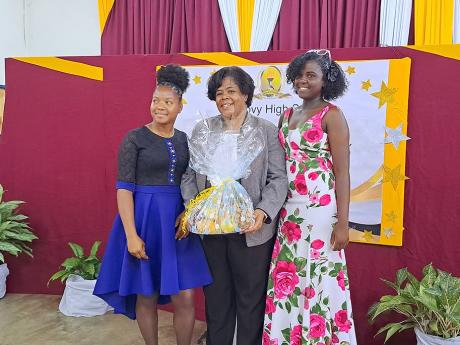The Internet is like a knife, warns Dr Pinnock
Education ministry rep counsels students on safe use of social media, online platforms
WESTERN BUREAU:
Dr Michelle Pinnock, the regional director for the Ministry of Education’s Region Four, says young people should closely evaluate how they use the digital landscape, because it has the potential to be used for both criminal activities as well as for the screening of candidates by job recruiters.
“The Internet is like a knife. A knife is very useful, and you cannot exist without a knife in your house. But, if you do not use it properly, it can cause a lot of problems. So it is with the Internet, as it is a good thing but it has to be managed properly,” said Pinnock who was giving the keynote address at Anchovy High School’s inaugural Principal’s Repast for High Achievers. Fifteen students from Grade Eight to sixth form were awarded for making the school’s honour roll.
“Young people, in order for you to get a job or to go to university, what people do is that they check your Facebook status, your Instagram, your social media record - they call it your digital footprints. We have to make sure we understand this whole business of our Internet because, when we talk about discipline, you must understand that, even though someone is not over your back watching you, you have to make the right decision since every decision has a consequence,” added Pinnock.
Pinnock’s warning comes one month after similar concerns were raised by education stakeholders, who noted that increased Internet access by students during the COVID-19 pandemic has led to an uptick in underage sexual content being shared on social media and other online platforms.
In March, reports surfaced that students were posting sexually explicit images of themselves online, either willingly as part of efforts to gain ‘likes’ on social media, or because of acts of revenge porn, where nude photos or videos of persons are shared without their knowledge or consent.
Stakeholders had also previously issued warnings for young people to be mindful of the digital footprints they leave behind while using the Internet. In 2017, a group of Grade 10 students from St Catherine High School in Spanish Town, were suspended for participating in a raunchy social media challenge.
According to Pinnock, it is crucial for people to be mindful of who they allow to influence their lives on a day-to-day basis.
“Our young people have a lot to teach us, and we adults have a lot to learn. Let us make sure that we mirror that art of growing and continuing to be more, and let us encourage each other,” said Pinnock. “Take your phones, check your contacts and your call logs and see if those calls that you made or received today, if they are allowing you to grow.”
“Some of those persons who you spoke with today, they need to be deleted out of your life, because they are holding you back, and distractors come in many different shapes and forms,” added Pinnock.

